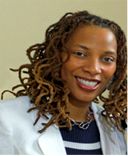In my college days in search to self identity as a black woman living in America, I read a lot of literature. One of my favorite authors during my quest was scholar bell hooks. She has a no-holds barred approach to discussing race and black women’s place or misplace in society. She often says black women need to define ourselves and self-actualize, that is become who we defined ourselves to be. That resonated with me as one who always thought there was nothing wrong with my natural hair; I decided that I was okay with a kinky mane so I reverted to natural and was not ashamed.
Professor Clenora Hudson-Weems, Ph.D., author of Africana Womanism: Reclaiming Ourselves, also believes in self-definition. Though her theory sounds like Alice Walker’s womanism, Dr. Hudson-Weems takes exception to Walker’s term (see previous entry). She believes that the great emphases shouldn’t be on the woman, her sexuality and culture and that the comparison between feminism and womanism are too closely aligned. Her Africana womanist, in contrast, “is significantly different from the mainstream feminist, particularly in her perspective on and approach to issues in society” (24). Dr. Hudson-Weems advances her position with the following 18 characteristics of Africana womanism: self-namer; self-definer; family-centered; in concert with males in struggle; flexible roles; genuine sisterhood; strength; male compatible; respected; recognized; whole; authentic; spirituality; respectful of elders; adaptable; ambitious; mothering; and nurturing.
For the most part, I like her list. But as you already guessed it, I take exception to some of the characteristics, especially the first two. Do you, from your own opinion, name and define who you are or do you claim the name and definition that Christ has given you? As a Christian who is black and a woman, I must accept my God-given blackness and womanhood and never deny these aspects of me. But before I am black and woman I am a Christian and must embrace what Christ says about me.
Copyright 2009 by Rhonda J. Smith

